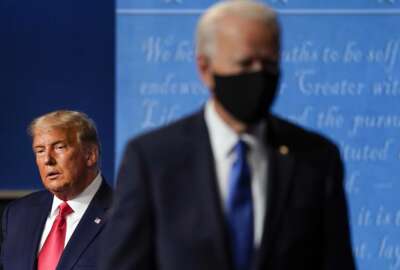
An update on modernizing Congress
It may not gain a lot of traction with constituents, but modernizing the Congress itself is a high priority for at least a few members. Among them, members of t...
Best listening experience is on Chrome, Firefox or Safari. Subscribe to Federal Drive’s daily audio interviews on Apple Podcasts or PodcastOne.
It may not gain a lot of traction with constituents, but modernizing the Congress itself is a high priority for at least a few members. Among them, members of the Select Committee on the Modernization of Congress. Its recommendations cover a lot of territory. Rep. Derek Kilmer (D-Wash.) is the chairman of the committee. He spoke with Federal Drive with Tom Temin for a progress report and what we might expect in the 117th Congress.
Interview transcript:
Tom Temin: Now Representative Graves has retired from Congress, so kind of your left hand man or right hand, man, I’m not gonna get into that one, who’s on the right and who’s on the left, but you’re kind of operating without a longtime cohort here.
Rep. Derek Kilmer: Yeah, he’s been a terrific partner. And honestly, this has been a very unique committee in that we had six Democrats and Republicans, and we really did function in a very bipartisan way. And in the end, the 116th Congress wraps up, we have passed nearly 100 recommendations with broad bipartisan support. And it’s a committee whose mission was pretty straightforward, and that is make Congress work better for the American people. This happens every few decades or so. And the last committee like ours was back in the early 90s. And vice chair Graves and I really were terrific partners. But I would add, I think our 12 committee members in total really functioned as a great team.
Tom Temin: And among the recommendations, and you have written about this recently, is Congress regaining its control of the purse that is to say, the budget process. And as we all know, nobody can remember the last time a budget started, all passed, signed, sealed and delivered on the first day of the fiscal year. How can that happen? What’s your recommendation for that?
Rep. Derek Kilmer: Well, I think it’s important to acknowledge the problem statement first. And that is as you suggested, Congress, more often than not, it has not been able to pass spending bills on time. We’re seeing that now as Congress is contemplating kicking the can another week. And that’s a real concern. And so our committee made seven recommendations focused specifically on budget and appropriations process reforms in hopes of dialing down some of the dysfunction that we’ve seen. In addition, part of our focus as a committee was on how to reclaim Congress’s Article One powers. The founders intended for Congress to be a co-equal branch of government. We’ve really seen that erode specifically with regard to the power of the purse. And with that in mind, our committee with broad bipartisan support proposed restoring the ability of Congress to make investments in member districts. That happens now, it happens in marble buildings 3,000 miles away, not by people who are closest to their districts. And what we proposed was what we call the community focus grant program, it’d be a competitive grant program that’s really grounded in transparency, accountability, and making meaningful and transformative investments in the communities that we represent. The idea is that taxpayer dollars under this approach would be spent more efficiently, more transparently, with some guardrails against abuse, with the hope that we can end the government shutdowns and continuing resolutions and some of the problems that you’ve seen in recent years.
Tom Temin: It sounds a little bit like sort of son or daughter of earmarks for the 21st century such that there’s a little bit more lubrication for members to reach agreement.
Rep. Derek Kilmer: Well, again, I think part of the challenge that you’ve seen in recent years is the inability to pass spending bills on time. Since fiscal year 2012, not a single standalone appropriations bill has been signed into law. Congress has only passed all 12 appropriations bills before the end of the fiscal year four times since 1977. And the upshot of that is inconsistent funding, continuing resolutions, government shutdowns, which have really negatively impacted not just federal agencies, they’ve negatively impacted our local communities. And so we recognize that something needs to change there. And our committee members felt that a commitment to local investments could help bring members of Congress really from both sides of the aisle together to pass timely spending bills, but that it was important to do things differently so that you had more efficiency, more transparency, more guardrails against abuse. And another difference is that the program that we laid out really sought to significantly increase local input in the federal process and generate much more collaboration between representatives and their constituents in the annual funding process.
Tom Temin: And one technological issue I wanted to ask you about came up I guess since all of your work has been underway, and that is how the pandemic has affected Congress’s ability to work. There was a pretty good, effective pivot to the remote hearings and the remote meetings and so forth. Voting though has still been either by proxy or in person. And now there is the House Administration Committee reports that says the technology exists to have remote voting that is also secure. Does this come under the modernization rubric do you think? And what could happen with that finding from the House Administration Committee?
Rep. Derek Kilmer: Well, I’ll say up front, even before the pandemic hit, our committee was looking both at issues related to technology and important issues related to continuity of government. And obviously, once the pandemic struck, we developed a set of continuity recommendations. I think we spoke to you and your audience about that this summer, Vice Chair Graves and I did. So I’ll give you a few examples. Prior to the pandemic, we recommended that the House update its procedures for allowing members to add or remove their names as bill cosponsors, enabling them to do it electronically. As the beginning of the $6 million Man TV show says we have the technology. We recommended that the house expand the use of digital signatures and enable committee reports to be submitted electronically, all of those things were pretty straightforward. Less straightforward are issues related to the voting on the House floor. Our committee in the rule that established it is required to get a supermajority vote to make any recommendations. And I would say, changes regarding voting on the floor, whether it be proxy voting, as is now allowed under the House rules, or even looking at using technology for voting, those have not been as bipartisan evidenced by the fact that the authority right now is in litigation challenging the ability even to proxy votes.
Tom Temin: Right. So that’s one probably the you won’t push as hard because there is a basic, I guess, philosophical divide there.
Rep. Derek Kilmer: I think there is legitimacy in looking at the issue, though, right, looking at how do we use technology to have Congress work for the American people. If our work continues into the new year, we will have a further look at some of these issues related to continuity of government. And there may be circumstances where, God forbid, it may be challenging for 435 members of Congress to be able to be under one roof. And that might be worthy of further exploration. There have been efforts in the past to look at these issues related to continuity of government, but they have not gotten the attention and the change that may be required.
Tom Temin: So getting back to the list of 100 recommendations that the committee did adopt, you’ve got a new Congress coming in a few weeks, the 117th — presuming your committee continues to be in operation, what are your priorities? Because 100 recommendations is pretty hard to get through any Congress.
Rep. Derek Kilmer: Yeah, I think the good news is you’ve seen a lot of support for what we’ve laid out. Our first set of recommendations were turned into a House resolution, and actually already passed out of the House and are in the process of being implemented. Some have already been implemented. That was about, I want to say about three dozen. There are other recommendations among our 97. And folks can actually check out our recommendations and actually check out a report from our committee, they can find it at just modernizecongress.house.gov. But our intent is to turn those recommendations into policy, whether that be having them incorporated into House rules, whether that be through another House resolution, or in the instance of, for example, the budget and appropriations process reforms, many of those recommendations will require statutory changes that have to pass the House, pass the Senate and be signed by the President. And so our intent one is to take up those issues. And as a committee, our goal was not just to pass recommendations or to put out a report, but to actually change the way Congress functions with an eye towards having a function better for the American people. So since we last spoke, we passed recommendations dealing with schedule and calendar reform with congressional capacity and looking at Congress’s Article One responsibilities, as I mentioned, the budget and appropriations process reform. So we’ve got some, I think, very good ideas in that space. There are other things I think that will require more attention. Our committee, I think, kind of scratched the surface on some of the issues related to civility and the function and productivity of committees, issues around recruitment, retention and diversity of staff. We made a good amount of progress on those issues. But I think there’s more to be done there as well.
Tom Temin: Alright. And House and Senate, can this happen on both sides?
Rep. Derek Kilmer: Well, I actually think that there’s a real opportunity. Many of the recommendations we made would require statutory changes that would require Senate action as well. Listen, the House is not unique in the fact that according to recent polling, it’s less popular than headlice, colonoscopies in the rock band Nickelback. The Senate, I think is also in the eyes of many of the American people sort of punching below its weight. So I think there are opportunities to engage on reform. Certainly the House still has more work to do. I would argue that the Senate has work to do too. There may be opportunities for bicameral collaboration there.
Copyright © 2024 Federal News Network. All rights reserved. This website is not intended for users located within the European Economic Area.
Tom Temin is host of the Federal Drive and has been providing insight on federal technology and management issues for more than 30 years.
Follow @tteminWFED





